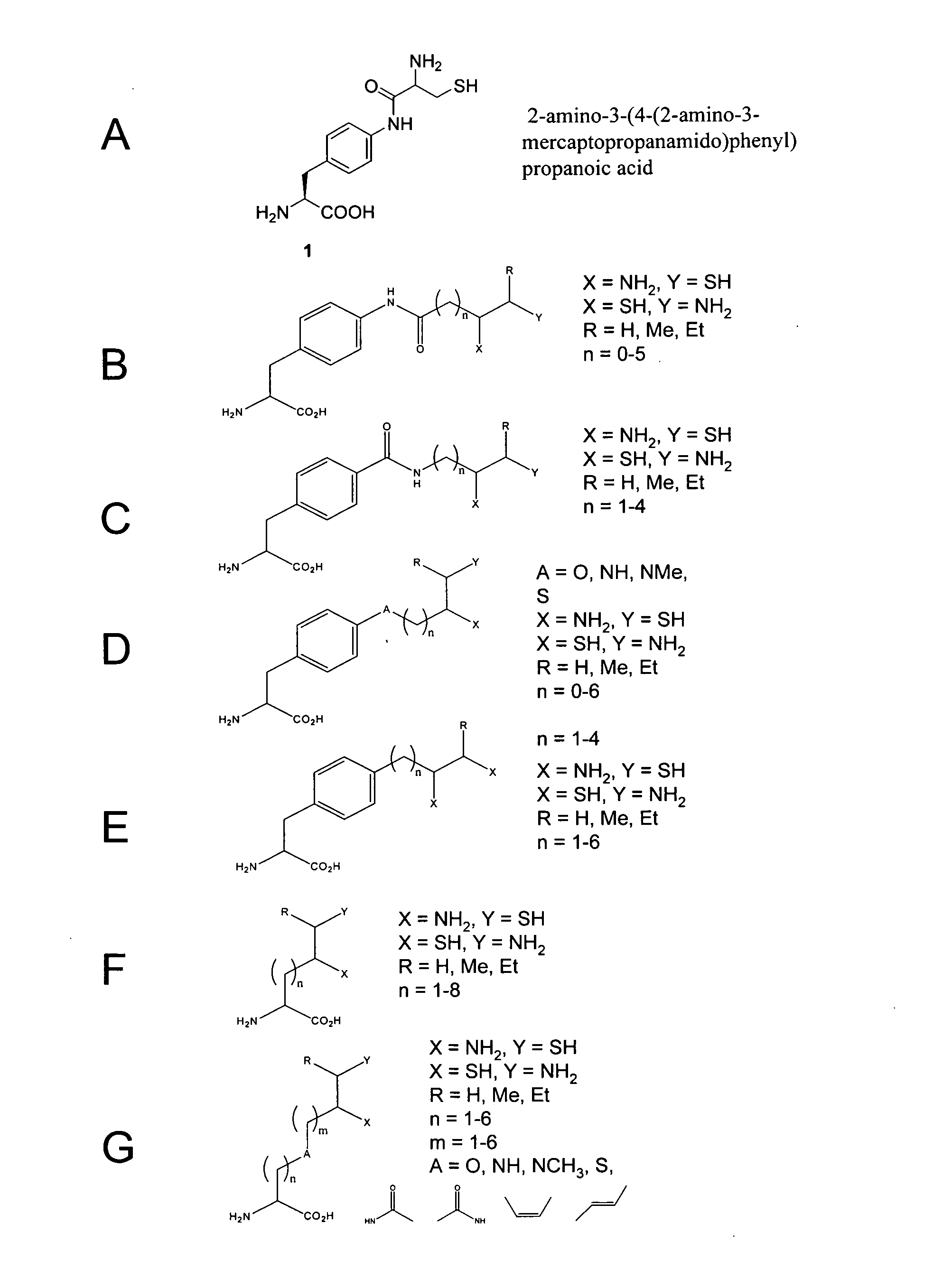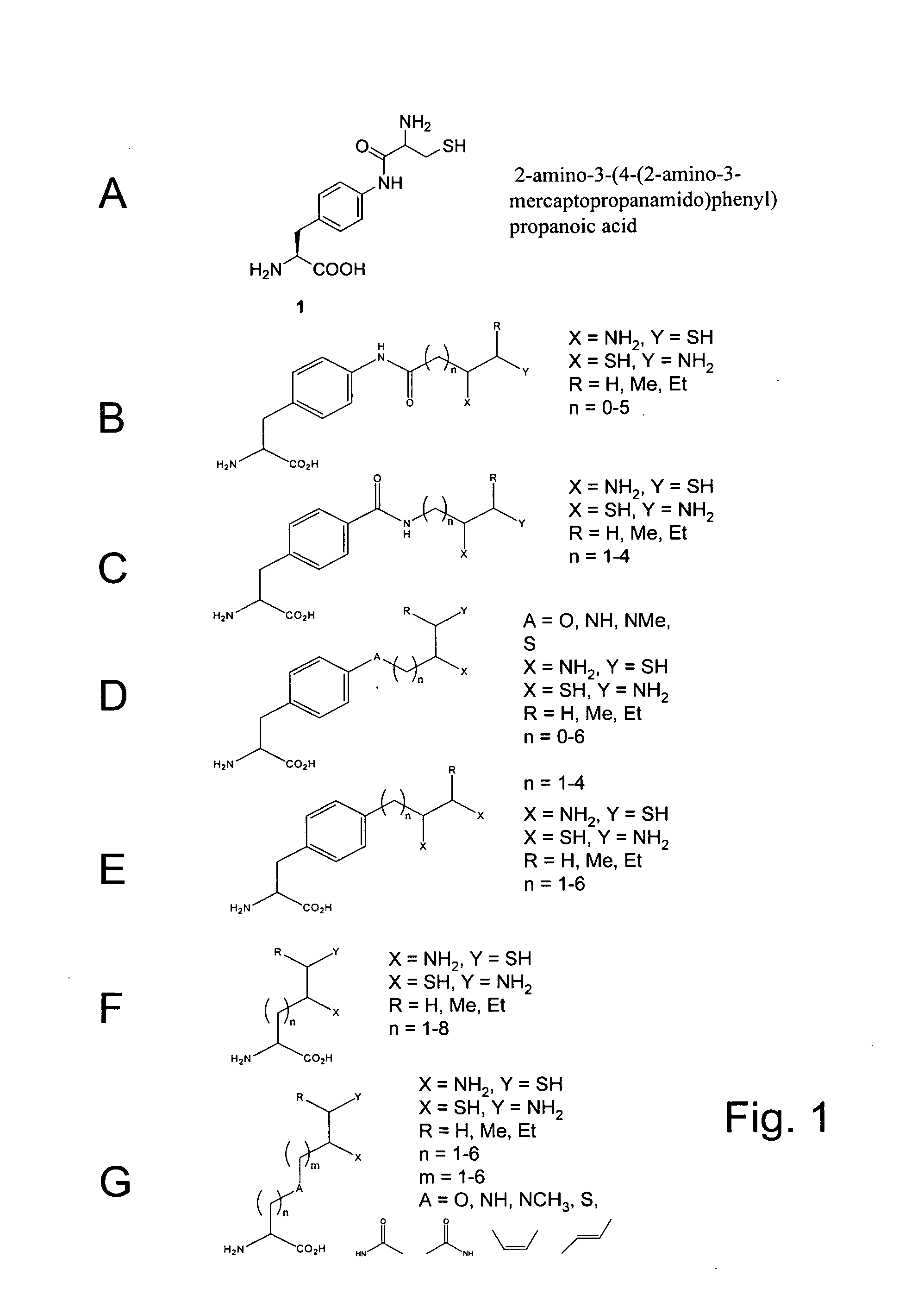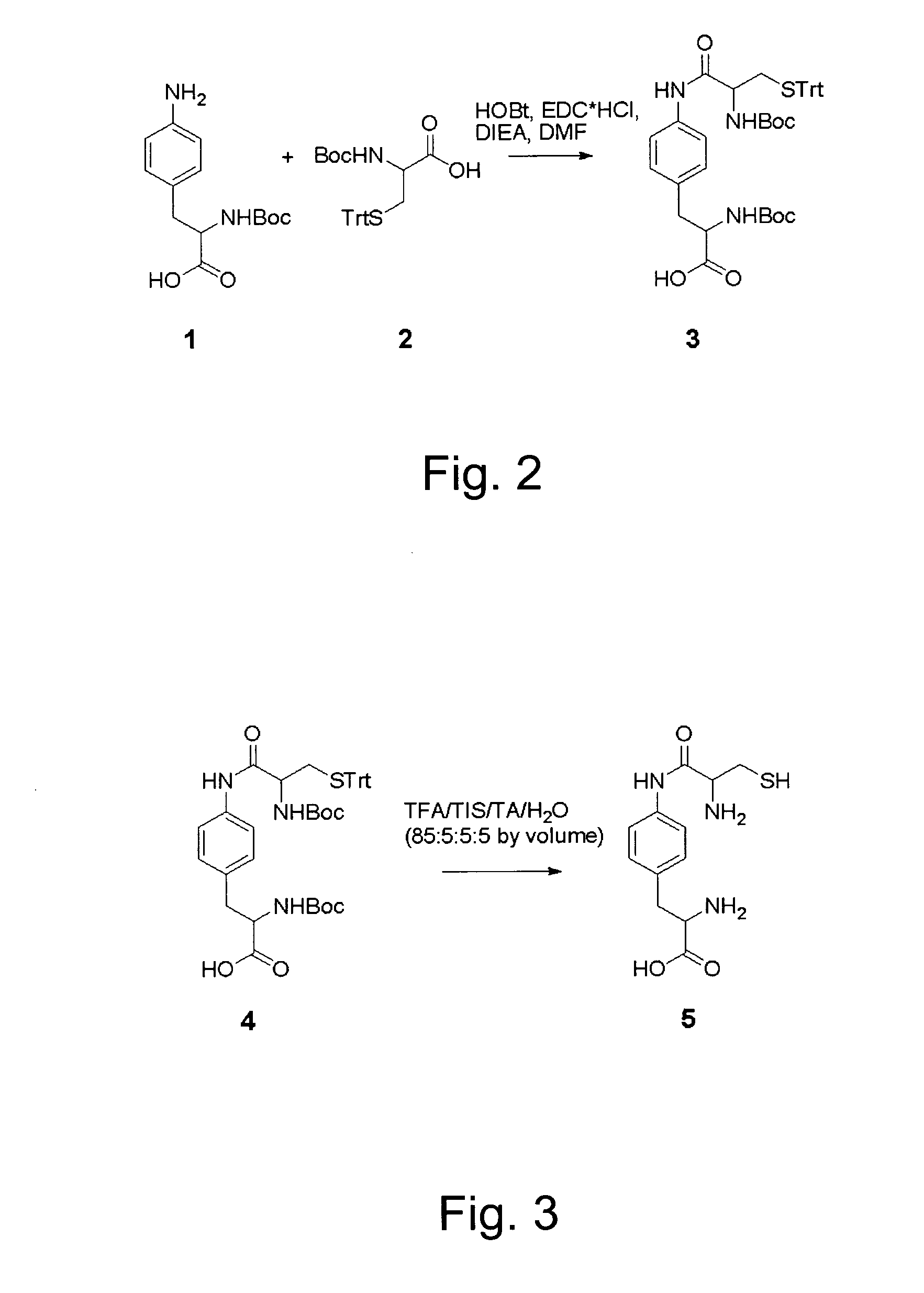In vivo incorporation of an unnatural amino acid comprising a 1,2-aminothiol group
a technology of amino acids and amino acids, applied in biochemistry, organic chemistry, biochemical apparatus and processes, etc., can solve the problems of n-terminal cysteine residue requirements and limited formation of peptide bonds
Inactive Publication Date: 2011-03-31
THE SCRIPPS RES INST
View PDF0 Cites 0 Cited by
- Summary
- Abstract
- Description
- Claims
- Application Information
AI Technical Summary
Benefits of technology
[0037]Preferentially aminoacylates: As used herein in reference to orthogonal translation systems, an O-RS “preferentially aminoacylates” a cognate O-tRNA when the O-RS charges the O-tRNA with, e.g., an unnatural amino acid that comprises a 1,2 aminothiol group, e.g., any of the unnatural amino acids depicted in FIG. 1, more efficiently than it charges any endogenous tRNA in an expression system. That is, when the O-tRNA and any given endogenous tRNA are present in a translation system in approximately equal molar ratios, the O-RS will charge the O-tRNA more frequently than it will charge the endogenous tRNA. Preferably, the relative ratio of O-tRNA charged by the O-RS to endogenous tRNA charged by the O-RS is high, preferably resulting in the O-RS charging the O-tRNA exclusively, or nearly exclusively, when the O-tRNA and endogenous tRNA are present in equal molar concentrations in the translation system. The relative ratio between O-tRNA and endogenous tRNA that is charged by the O-RS, when the O-tRNA and O-RS are present at equal molar concentrations, is greater than 1:1, preferably at least about 2:1, more preferably 5:1, still more preferably 10:1, yet more preferably 20:1, still more preferably 50:1, yet more preferably 75:1, still more preferably 95:1, 98:1, 99:1, 100:1, 500:1, 1,000:1, 5,000:1 or higher.
Problems solved by technology
The requirement for an N-terminal cysteine residue is an intrinsic limitation of the NCL reaction.
Method used
the structure of the environmentally friendly knitted fabric provided by the present invention; figure 2 Flow chart of the yarn wrapping machine for environmentally friendly knitted fabrics and storage devices; image 3 Is the parameter map of the yarn covering machine
View moreImage
Smart Image Click on the blue labels to locate them in the text.
Smart ImageViewing Examples
Examples
Experimental program
Comparison scheme
Effect test
examples
[0115]The following examples are offered to illustrate, but not to limit the claimed invention. It is understood that the examples and embodiments described herein are for illustrative purposes only and that various modifications or changes in light thereof will be suggested to persons skilled in the art and are to be included within the spirit and purview of this application and scope of the appended claims.
the structure of the environmentally friendly knitted fabric provided by the present invention; figure 2 Flow chart of the yarn wrapping machine for environmentally friendly knitted fabrics and storage devices; image 3 Is the parameter map of the yarn covering machine
Login to View More PUM
| Property | Measurement | Unit |
|---|---|---|
| Efficiency | aaaaa | aaaaa |
| Angle | aaaaa | aaaaa |
Login to View More
Abstract
The invention relates to orthogonal pairs of tRNAs and aminoacyl-tRNA synthetases that can incorporate unnatural amino acids that comprise a 1,2 aminothiol group into polypeptides. The invention provides translation systems in which polypeptides comprising unnatural amino acids that comprise a 1,2 aminothiol group can be produced. The invention also provides methods for producing polypeptides containing unnatural amino acids that comprise a 1,2 aminothiol group. Also provided by the invention are compositions comprising orthogonal aminoacyl-tRNA synthetases that preferentially aminoacylate a cognate orthogonal tRNA with unnatural amino acids that comprise a 1,2 aminothiol group. The invention provides methods for the synthesis of the unnatural amino acid 2-amino-3-(4-(2-amino-3-mercaptopropan-amido)phenyl)-propanoic acid.
Description
CROSS-REFERENCE TO RELATED APPLICATIONS[0001]This application claims priority to and benefit of U.S. Provisional Patent Application Ser. No. 61 / 067,524, entitled, “IN VIVO INCORPORATION OF AN UNNATURAL AMINO ACID COMPRISING A 1,2-AMINOTHIOL GROUP,” by Simon Ficht, et al., filed Feb. 27, 2008, the contents of which are incorporated herein by reference in their entirety for all purposes.STATEMENT AS TO RIGHTS TO INVENTIONS MADE UNDER FEDERALLY SPONSORED RESEARCH AND DEVELOPMENT[0002]The invention was made with United States Government support under Grant DE-FG02-03ER46051 from the Department of Energy. The United States Government has certain rights in the invention.FIELD OF THE INVENTION[0003]The invention is in the field of translation biochemistry. The invention relates to compositions and methods for making and using orthogonal tRNAs, orthogonal aminoacyl-tRNA synthetases, and O-RS / O-tRNA pairs that incorporate unnatural amino acids that comprise a 1,2 aminothiol group into protei...
Claims
the structure of the environmentally friendly knitted fabric provided by the present invention; figure 2 Flow chart of the yarn wrapping machine for environmentally friendly knitted fabrics and storage devices; image 3 Is the parameter map of the yarn covering machine
Login to View More Application Information
Patent Timeline
 Login to View More
Login to View More IPC IPC(8): C12P21/02C12N9/00C07H21/00
CPCC12P21/02C12N15/67
Inventor FICHT, SIMONJAHNZ, MICHAELGRUNEWALD, JANSCHILLER, STEFANSCHULTZ, PETER G.
Owner THE SCRIPPS RES INST
Features
- R&D
- Intellectual Property
- Life Sciences
- Materials
- Tech Scout
Why Patsnap Eureka
- Unparalleled Data Quality
- Higher Quality Content
- 60% Fewer Hallucinations
Social media
Patsnap Eureka Blog
Learn More Browse by: Latest US Patents, China's latest patents, Technical Efficacy Thesaurus, Application Domain, Technology Topic, Popular Technical Reports.
© 2025 PatSnap. All rights reserved.Legal|Privacy policy|Modern Slavery Act Transparency Statement|Sitemap|About US| Contact US: help@patsnap.com



